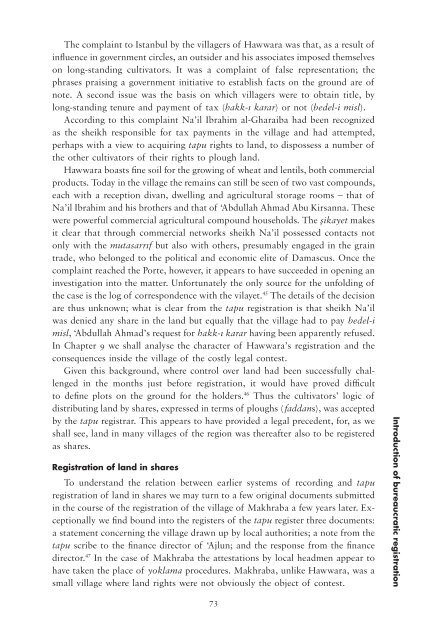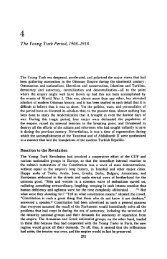Governing property, making the modern state - PSI424
Governing property, making the modern state - PSI424
Governing property, making the modern state - PSI424
You also want an ePaper? Increase the reach of your titles
YUMPU automatically turns print PDFs into web optimized ePapers that Google loves.
The complaint to Istanbul by <strong>the</strong> villagers of Hawwara was that, as a result of<br />
influence in government circles, an outsider and his associates imposed <strong>the</strong>mselves<br />
on long-standing cultivators. It was a complaint of false representation; <strong>the</strong><br />
phrases praising a government initiative to establish facts on <strong>the</strong> ground are of<br />
note. A second issue was <strong>the</strong> basis on which villagers were to obtain title, by<br />
long-standing tenure and payment of tax (hakk-ı karar) or not (bedel-i misl).<br />
According to this complaint Na’il Ibrahim al-Gharaiba had been recognized<br />
as <strong>the</strong> sheikh responsible for tax payments in <strong>the</strong> village and had attempted,<br />
perhaps with a view to acquiring tapu rights to land, to dispossess a number of<br />
<strong>the</strong> o<strong>the</strong>r cultivators of <strong>the</strong>ir rights to plough land.<br />
Hawwara boasts fine soil for <strong>the</strong> growing of wheat and lentils, both commercial<br />
products. Today in <strong>the</strong> village <strong>the</strong> remains can still be seen of two vast compounds,<br />
each with a reception divan, dwelling and agricultural storage rooms – that of<br />
Na’il Ibrahim and his bro<strong>the</strong>rs and that of ‘Abdullah Ahmad Abu Kirsanna. These<br />
were powerful commercial agricultural compound households. The şikayet makes<br />
it clear that through commercial networks sheikh Na’il possessed contacts not<br />
only with <strong>the</strong> mutasarrıf but also with o<strong>the</strong>rs, presumably engaged in <strong>the</strong> grain<br />
trade, who belonged to <strong>the</strong> political and economic elite of Damascus. Once <strong>the</strong><br />
complaint reached <strong>the</strong> Porte, however, it appears to have succeeded in opening an<br />
investigation into <strong>the</strong> matter. Unfortunately <strong>the</strong> only source for <strong>the</strong> unfolding of<br />
<strong>the</strong> case is <strong>the</strong> log of correspondence with <strong>the</strong> vilayet. 45 The details of <strong>the</strong> decision<br />
are thus unknown; what is clear from <strong>the</strong> tapu registration is that sheikh Na’il<br />
was denied any share in <strong>the</strong> land but equally that <strong>the</strong> village had to pay bedel-i<br />
misl, ‘Abdullah Ahmad’s request for hakk-ı karar having been apparently refused.<br />
In Chapter 9 we shall analyse <strong>the</strong> character of Hawwara’s registration and <strong>the</strong><br />
consequences inside <strong>the</strong> village of <strong>the</strong> costly legal contest.<br />
Given this background, where control over land had been successfully challenged<br />
in <strong>the</strong> months just before registration, it would have proved difficult<br />
to define plots on <strong>the</strong> ground for <strong>the</strong> holders. 46 Thus <strong>the</strong> cultivators’ logic of<br />
distributing land by shares, expressed in terms of ploughs (faddans), was accepted<br />
by <strong>the</strong> tapu registrar. This appears to have provided a legal precedent, for, as we<br />
shall see, land in many villages of <strong>the</strong> region was <strong>the</strong>reafter also to be registered<br />
as shares.<br />
Registration of land in shares<br />
To understand <strong>the</strong> relation between earlier systems of recording and tapu<br />
registration of land in shares we may turn to a few original documents submitted<br />
in <strong>the</strong> course of <strong>the</strong> registration of <strong>the</strong> village of Makhraba a few years later. Exceptionally<br />
we find bound into <strong>the</strong> registers of <strong>the</strong> tapu register three documents:<br />
a <strong>state</strong>ment concerning <strong>the</strong> village drawn up by local authorities; a note from <strong>the</strong><br />
tapu scribe to <strong>the</strong> finance director of ‘Ajlun; and <strong>the</strong> response from <strong>the</strong> finance<br />
director. 47 In <strong>the</strong> case of Makhraba <strong>the</strong> attestations by local headmen appear to<br />
have taken <strong>the</strong> place of yoklama procedures. Makhraba, unlike Hawwara, was a<br />
small village where land rights were not obviously <strong>the</strong> object of contest.<br />
73<br />
Introduction of bureaucratic registration












